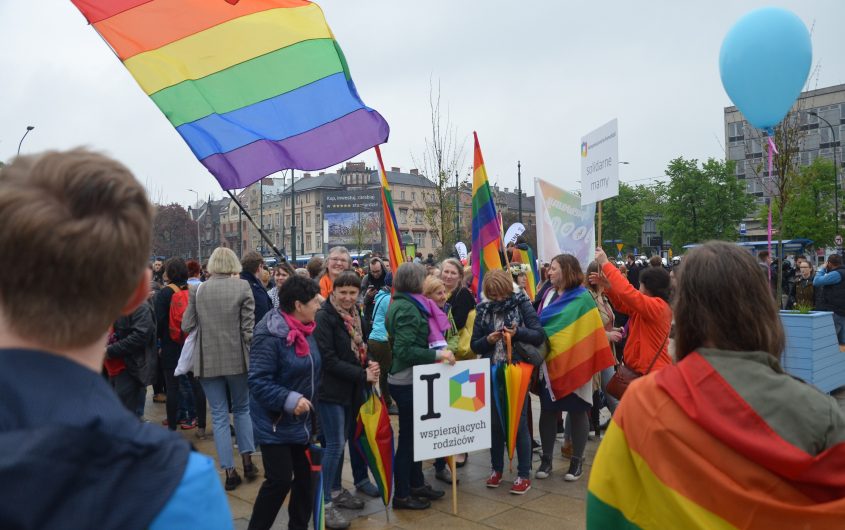
Silar via Wikimedia Commons
Trump’s Ambassador in Berlin Will Push to Decriminalize Homosexuality Worldwide. Surprised? Here’s Why.

Phillip Ayoub
Occidental College
Phillip M. Ayoub is Associate Professor of Diplomacy and World Affairs at Occidental College. His research bridges insights from international relations and comparative politics, engaging with literature on transnational politics, gender and politics, norm diffusion, and the study of social movements. Alongside several articles, he is the author of When States Come Out: Europe’s Sexual Minorities and the Politics of Visibility (Cambridge, 2016) and co-editor, with David Paternotte, of LGBT Activism and the Making of Europe (Palgrave, 2014). In 2014, he was the recipient of the American Political Science Association’s Human Rights and Politics & Sexuality section awards for Best Dissertation. The following year, he received the European Union Studies Association's biennial 2013-2014 award for Best Dissertation. He also received the 2014 Janice N. and Milton J. Esman Graduate Prize for distinguished scholarship (from Cornell University), the 2017 Best Article of the Year Award from the Council of European Studies’ Gender and Sexuality Research Network, and the 2018 Provost Award for Outstanding Early-Career Scholarly Achievement (Drexel University). Please visit www.phillipmayoub.com for further information.
He is a 2018-2019 participant in AICGS’ project “A German-American Dialogue of the Next Generation: Global Responsibility, Joint Engagement,” sponsored by the Transatlantik-Programm der Bundesrepublik Deutschland aus Mitteln des European Recovery Program (ERP) des Bundesministeriums für Wirtschaft und Energie (BMWi).
In February 2019, U.S. ambassador to Germany Richard Grenell announced that the U.S. would push to decriminalize homosexuality globally. Sexual relations between two people of the same sex is criminalized by law in over 70 countries around the world. Others in the administration, including Donald Trump, appear less familiar with the plan than Grenell, who is openly gay.
The announcement surprised many, given the strong ties between some Trump officials and conservatives who oppose LGBTQ rights. For instance, Trump’s vice president Mike Pence recently spoke at the annual meeting of the Family Research Council, and is known to oppose LGBTQ rights. Here’s what’s going on.
Obama Made LGBTQ Rights a Foreign Policy Priority
U.S.-based activists have a long history of global activism on LGBTQ rights, both for and against. Under the Obama administration, the U.S. government began making support for such rights a foreign policy priority. For instance, President Barack Obama appointed a Special Envoy for LGBT and intersex rights in the U.S. Department of State in 2015. That position has been vacant since November 2017.
The Trump Administration Has a Different Approach
The Trump administration has changed course. Most immediately, its silence has been notable; the administration doesn’t speak on LGBTQ rights and fails to recognize politically important events like June Pride Month. More significantly, it has taken several policy steps that push against LGBTQ rights, including making it easier for employers to claim religious reasons for refusing to serve or employ LGBTQ people; appointing judges, including Supreme Court justice Neil Gorsuch, with records of attempting to limiting the rights of same-sex parents; excluding LGBTQ organizations from consulting with some federal agencies; voting against a United Nations resolution to condemn the use of the death penalty against homosexuality; seeking to ban transgender people from serving in the military; dismissing the complaints of students who wish to use a restroom matching their gender identity; and removing protections for transgender inmates.
Vice President Mike Pence, who according to NBC News supports this initiative to decriminalize homosexuality worldwide, is well known as a Christian evangelical who opposes LGBTQ rights. In the past, he’s supported gay conversion therapy; as governor of Indiana, he signed a religious freedom bill that human rights groups warned would allow discrimination against LGBTQ people.
Support for Gay Rights Sometimes Joins with Opposition to Immigration
Given this history, why is the Trump administration now pushing to decriminalize homosexuality worldwide?
To understand, it’s useful to look closely at the initiative’s main proponent, Richard Grenell. He has spoken out in favor of gay rights, although notably less on transgender rights, while taking hawkish positions on national security, migration (especially from Islamic countries), and Iran. Furthermore, Grenell has stated that he “absolutely want[s] to empower other conservatives throughout Europe” and has been accused of publicly making misogynistic comments.
Grenell links support of the initiative to decriminalize homosexuality with his frequent criticism of Islam and of Angela Merkel’s migrant and refugee policies. That approach exemplifies what scholars call “homonationalism,” a term originally coined by political scientist Jasbir Puar. Homonationalism, she argues, uses “progressive” claims on gay rights to justify exclusionary forms of national identity. Western societies are portrayed as better than other, “backward” societies to justify anti-Islamic and anti-immigrant politics.
Some well-known politicians who take this approach include the Netherlands’ Geert Wilders, France’s Marine Le Pen, and Germany’s Alice Weidel and Jens Spahn. For example, Weidel, the co-parliamentary leader of the German anti-immigrant Alternative for Germany (AfD), said that among her motivations for leading a party that addresses the “problem” of Muslim migration is that she’s gay.
Leading LGBTQ rights groups in the U.S. and Europe say they were not consulted on this plan—perhaps because they might have been skeptical of this approach. Some commentators even suspect that the program is intended to provide more pretexts for a push to attack Iran.
Increased Migration May Lead to Increased Mobilization for LGBTQ Rights
However, the homonationalist analysis of immigration and politics does not appear to accurately reflect reality. LGBTQ rights have expanded rapidly as the world has become more interconnected and nations have become more porous—which may mean that more migration leads more countries to support LGBTQ rights. My research with Lauren Bauman tests the relationship between migration inflows and LGBTQ mobilization. We conducted in-depth interviews with migrant LGBTQ activists in Europe. Further, we examined quantitative data (relying on OECD and ILGA archival data) about the relationship between migrant inflows and the proliferation of LGBTQ organizations in 26 OECD countries (while controlling for factors like state wealth). Our findings suggest that migration increases the likelihood of LGBTQ organizing across borders—which I and other researchers have shown helps spread LGBTQ rights.
For example, in 2005 and 2006, LGBTQ Polish migrants in Germany helped channel resources and attention to Poland, at a time when the Polish city governments banned LGBTQ people from holding equality parades and other such gatherings. Migrants know that navigating sexuality can require different approaches and strategies in different places. When they’re included, they can help human rights campaigners package and explain LGBTQ identities in a way that resonates with communities in their home countries. The Polish activists, for example, sometimes use Catholic framing to package LGBTQ rights.
For these reasons, some scholars argue that migrants, including queer Muslim migrants, have helped expand the LGBTQ rights approach, putting new issues and countries on activists’ agendas.
LGBTQ groups, including international groups, with activists firmly rooted in their home countries may be the best voices for their own needs. If the Trump administration does move forward with this policy, it might wish to consider studies finding that when large Western countries try to impose their own views of LGBTQ rights on less-developed countries, those campaigns can trigger local and global backlash—and that local politicians often use that Western backing against local LGBTQ communities. For instance, in 2013 some advocates called on world leaders to boycott the Sochi Olympics to protest Russia’s broad ban on “gay propaganda.” And after Uganda’s parliament introduced antigay legislation in 2014, many countries cut aid. But many groups working with local and migrant LGBTQ advocates warned against aspects of these approaches, saying it could lead to more attacks. Dismissing key advocacy organizations and communities tied to countries targeted for change, like those in Grenell’s focus on Iran, may not produce intended results.
Furthermore, German and American groups have worked together to promote and expand LGBTQ rights in the past. In fact, the founder of the first U.S.-based gay rights group in Chicago (Society for Human Rights) in 1924 was Henry Gerber, a protégé of Berlin’s pioneer on sexuality research, Magnus Hirschfeld. Richard Grenell and conservative members of Germany’s political establishment are not be the right figures to keep the spirit of this long struggle and tradition alive.
An earlier version of this text appeared on February 27, 2019 at The Monkey Cage for The Washington Post as “The Trump administration will push to decriminalize homosexuality worldwide. Surprised? Here’s why.”








